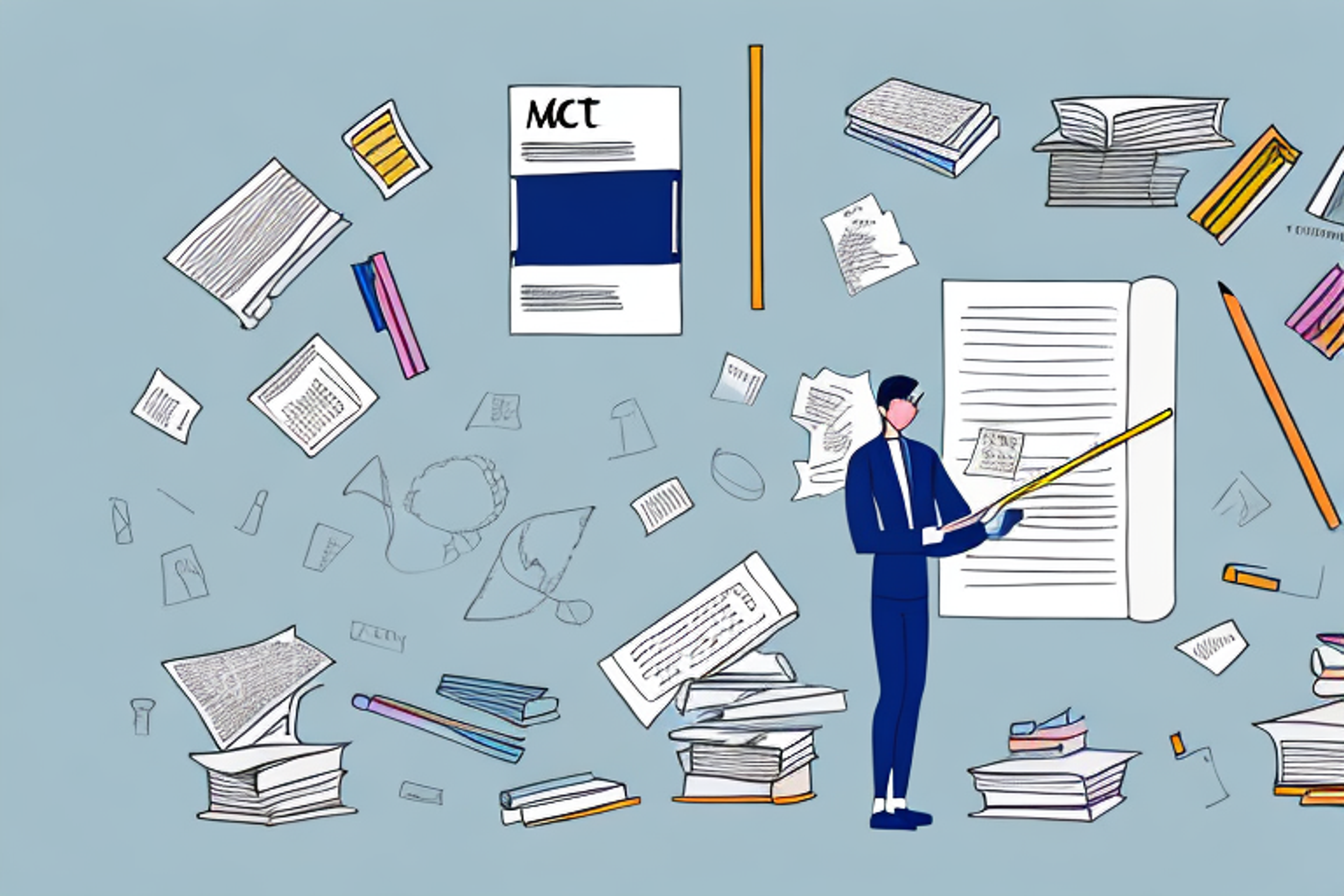
Table of Contents
The Medical College Admission Test (MCAT) is a challenging and rigorous exam that can be a source of anxiety for many students. While test anxiety is a common experience, excessive levels of anxiety can interfere with performance and lead to suboptimal results. In this article, we will explore the root causes of MCAT exam anxiety and provide comprehensive strategies for managing and overcoming it.
The Importance of Managing MCAT Exam Anxiety
Feeling anxious before or during an exam is normal, but when it reaches debilitating levels, it can lead to a range of negative outcomes. Excessive anxiety can impair memory, hinder concentration, and increase physical symptoms such as nausea and headaches. It can also result in poor decision-making and a negative impact on overall performance.
By understanding the root causes of your MCAT exam anxiety and implementing effective techniques to alleviate it, you can improve your chances of success and achieve your academic goals.
One effective technique for managing MCAT exam anxiety is to practice relaxation techniques such as deep breathing, meditation, or yoga. These techniques can help calm your mind and reduce physical symptoms of anxiety. Additionally, it is important to maintain a healthy lifestyle by getting enough sleep, eating a balanced diet, and exercising regularly. These habits can help reduce stress and improve overall well-being, which can in turn reduce anxiety levels.
Another helpful strategy is to seek support from others, such as friends, family, or a therapist. Talking about your anxiety with someone you trust can help you process your emotions and gain perspective. A therapist can also provide additional tools and techniques for managing anxiety and improving mental health.
Understanding the Root Causes of MCAT Exam Anxiety
MCAT exam anxiety can be triggered by a range of factors, including fear of failure, time pressure, high expectations, and uncertainty about the exam content. Understanding your individual triggers can help you develop targeted strategies to manage and overcome your anxiety.
It's important to recognize that anxiety is a natural response to stress, and it affects everyone differently. By acknowledging your anxiety and working to identify its causes, you can begin to implement effective coping strategies.
One common cause of MCAT exam anxiety is a lack of preparation. If you feel unprepared for the exam, it can lead to feelings of anxiety and stress. To combat this, it's important to create a study plan and stick to it. This can help you feel more confident and prepared for the exam.
Another factor that can contribute to MCAT exam anxiety is a lack of self-care. If you're not taking care of yourself physically and mentally, it can make it harder to manage stress and anxiety. Make sure you're getting enough sleep, eating well, and taking breaks to do things you enjoy.
Common Symptoms of MCAT Exam Anxiety and How to Recognize Them
Some common symptoms of MCAT exam anxiety include sweating, trembling, rapid heartbeat, shortness of breath, and muscle tension. If you experience any of these symptoms during the exam, it's essential to recognize them and take action to manage them appropriately.
One effective technique is to focus on your breathing, taking slow and deep breaths to counteract feelings of stress and anxiety. Additionally, practicing mindfulness meditation and progressive muscle relaxation can help reduce physical symptoms and promote a sense of calm and relaxation.
It's also important to note that exam anxiety can manifest in different ways for different people. Some individuals may experience more emotional symptoms, such as irritability, restlessness, or difficulty concentrating. Others may have physical symptoms, such as headaches or stomachaches. It's crucial to be aware of your own unique symptoms and to develop a personalized plan for managing them.
Effective Techniques for Coping with MCAT Exam Anxiety
Effective techniques for managing MCAT exam anxiety include creating a structured study plan, breaking down tasks into manageable steps, practicing relaxation techniques, and seeking support from peers, family, or professional support services.
One useful strategy is to develop a pre-exam routine that includes self-care activities such as exercise, meditation, or a relaxing bath. Additionally, planning ahead can help reduce anxiety, such as arriving at the exam center early, bringing extra pencils and supplies, and reviewing and organizing study materials beforehand.
Another effective technique for coping with MCAT exam anxiety is to practice mindfulness. This involves being present in the moment and focusing on your breath, thoughts, and feelings without judgment. Mindfulness can help you stay calm and centered during the exam, and can also improve your overall well-being.
Finally, it's important to remember that some level of anxiety is normal and even helpful during exams. It can motivate you to study harder and perform better. However, if your anxiety is interfering with your ability to function or causing significant distress, it may be helpful to seek professional help from a therapist or counselor.
Mindfulness Meditation for Reducing MCAT Exam Anxiety
Mindfulness meditation is a powerful tool for reducing MCAT exam anxiety. This technique involves focusing your attention on the present moment without judgment, allowing you to observe your thoughts and feelings without becoming overwhelmed by them.
Regular practice of mindfulness meditation can help improve focus and concentration, reduce negative self-talk, and promote a sense of calm and relaxation. Additionally, it can help you develop a greater sense of self-awareness, enabling you to recognize and manage your anxiety more effectively.
The Role of Breathing Exercises in Overcoming MCAT Exam Anxiety
Breathing exercises are another effective tool for managing MCAT exam anxiety. These techniques involve controlling your breathing patterns, such as taking slow and deep breaths or utilizing a technique called "box breathing," where you inhale for four seconds, hold for four seconds, exhale for four seconds, and hold again for four seconds.
By controlling your breathing, you can help calm your nervous system, reduce physical symptoms of anxiety, and improve overall feelings of well-being.
Progressive Muscle Relaxation Techniques for Managing MCAT Exam Anxiety
Progressive muscle relaxation is a technique that involves tensing and relaxing specific muscle groups in a systematic sequence. This technique can help reduce muscle tension, improve relaxation, and promote a sense of calm and well-being.
To practice progressive muscle relaxation, start by tensing a specific muscle group for a few seconds, such as your fists or shoulders. Then, release the tension and allow the muscle to relax completely. Repeat this sequence with other muscle groups throughout your body, working from your head to your toes.
Cognitive Behavioral Therapy (CBT) for Treating MCAT Exam Anxiety
Cognitive-behavioral therapy (CBT) is a type of therapy that focuses on changing negative thought patterns and behaviors. This therapy can be effective in treating MCAT exam anxiety by helping you to reframe negative thoughts, set realistic goals, and develop effective coping strategies.
CBT can be delivered through individual or group therapy sessions, and it can be an effective option for students who experience ongoing and persistent anxiety related to test-taking.
Tips for Preparing Mentally and Physically for the MCAT Exam
Preparing mentally and physically for the MCAT exam can help reduce anxiety and improve performance. Some useful tips include getting enough rest and sleep, eating nutritious foods, engaging in regular exercise, and practicing stress-management techniques.
It's also essential to develop a study plan that is effective and manageable, allowing you to review and retain the necessary information without becoming overwhelmed or overly stressed.
Strategies for Staying Calm and Focused During the MCAT Exam
During the MCAT exam, it's essential to stay calm and focused to achieve optimal results. Strategies for achieving this include taking breaks as needed, staying hydrated, utilizing relaxation techniques, and refocusing your attention when thoughts or feelings of anxiety arise.
Additionally, it's helpful to approach each question one at a time and to avoid becoming overly focused on time limits or perceived difficulty levels. By maintaining a calm and focused mindset, you can improve your concentration, reduce anxiety, and boost your performance.
How to Build Confidence and Boost Your Performance on the MCAT
Building confidence and self-assurance can be key to boosting your performance on the MCAT exam. Some effective strategies include visualizing success, cultivating positive self-talk, and developing a growth mindset.
It's also helpful to focus on your strengths and skills, creating a sense of resilience and self-assurance that you can draw upon during challenging moments. By building confidence, you can improve your overall mental and emotional well-being, reduce anxiety, and increase your chances of success.
Support Resources for Students Dealing with MCAT Exam Anxiety
For students dealing with MCAT exam anxiety, support resources are available. These resources may include counseling services, therapy, peer support groups, or stress-management programs.
It's important to reach out for support when needed and to develop a support network that can provide encouragement, guidance, and advice when necessary. By seeking support, you can reduce feelings of isolation, improve your ability to cope with stress, and increase your overall resilience and well-being.
Long-Term Solutions for Managing Test-Related Stress and Anxiety
Finally, for students experiencing ongoing and persistent test-related stress and anxiety, seeking out long-term solutions may be necessary. These solutions may include therapy, medication, or lifestyle changes such as improved sleep hygiene, healthy nutrition, and regular physical activity.
It's essential to develop a long-term plan that takes into account your individual needs and circumstances, and to work with a healthcare provider or mental health professional to implement effective solutions.
Conclusion
In summary, MCAT exam anxiety is a common experience that can interfere with academic performance and result in negative outcomes. By understanding the root causes of your anxiety, implementing effective techniques for coping and managing it, and seeking support when necessary, you can improve your chances of success and achieve your academic goals.












